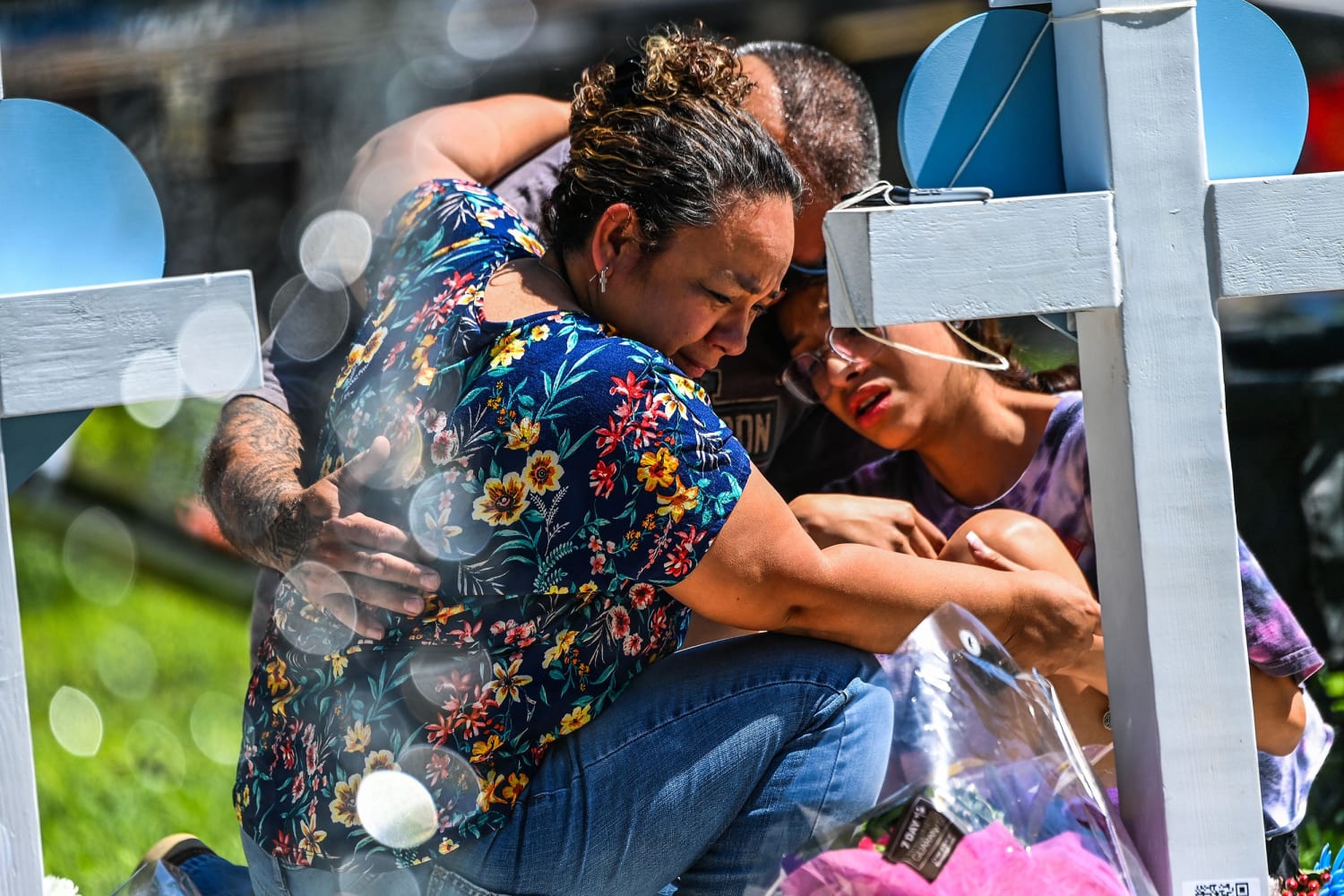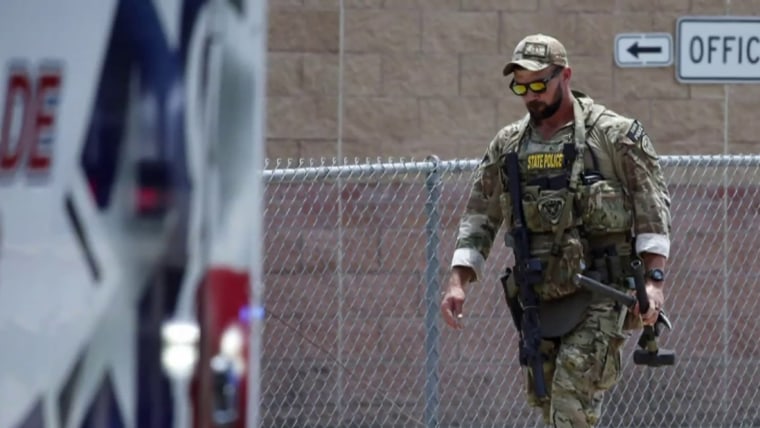A war may be raging on their eastern flank, but Ukrainian political leaders still took time out from their busy, traumatic lives to send condolences across the Atlantic after America’s latest horrific school shooting in Texas on Tuesday. In a sickening twist of fate, they even compared the U.S. — so long seen as a bastion of freedom and security, an impenetrable city on a hill — to their own tragic situation. “As a nation that goes through the pain of losing innocent young lives, Ukraine shares the pain of our U.S. friends,” Foreign Minister Dmytro Kuleba tweeted.
The simple, inescapable fact is that America’s failure to protect elementary school children in their place of learning, again, is a national disgrace of historic proportions. And as such, it has international dimensions, which underscore both the wide impact of the tragedy and the urgency that Washington take serious steps to address the problem. The school shooting epidemic undermines the U.S. in the eyes of both its allies and its adversaries, damaging its ability to provide leadership on human rights and increasing its vulnerability to enemy propaganda.
The geopolitical ramifications of the Uvalde massacre rippled all the way to China, where the spokesperson for the Foreign Ministry was asked to address it in a news conference Wednesday.
The United States is prepared to deploy its soldiers around the world in the name of protecting its citizens from threats and — as shown in Ukraine — is also willing to provide massive amounts of arms to allies so they can do the same. But as four-star former Marine Gen. John Allen wrote for the Brookings Institution in 2019, “Americans today are more likely to experience gun violence [at home] than they might in many of the places to which I deployed in the name of defending our nation.” Compared to other high-income countries, a child under 5 in the United States in 2019 was 29 times as likely to die from a gunshot wound.
That disconnect in American values isn’t just evident to military leaders like Allen. At a time when the U.S. finds itself in a renewed ideological Cold War between democracy and autocracy, the shootings hurt Washington’s ability to project U.S. values and serve as a model for what democracy can offer. The geopolitical ramifications of the Uvalde massacre rippled all the way to China, where the spokesperson for the Foreign Ministry was asked to address it in a news conference on Wednesday. The fact that he was asked such a question alone shows how these deadly events offer openings for our adversaries and distract from other international priorities.
“The U.S. government is callous about the systemic violation of the human rights of American people,” Wang Wenbin, the Chinese Foreign Ministry spokesperson, declared in answering the question posed about the shooting. “But in the meantime, it has been keen on wantonly attacking other countries and grossly interfering in their internal affairs under the pretext of human rights. This fully indicates that the U.S.’s claim to champion human rights is nothing but hypocritical rhetoric and empty talk.”
Tuesday’s shooting is particularly likely to damage America’s standing in speaking out against Russian violence against children in Ukraine, as Russian President Vladimir Putin in the past has tried to score political points with U.S. gun violence. “Look at American streets. People are getting killed there,” he said in 2021. “You can get a bullet in the neck.”
The shooting epidemic also opens up the U.S. to an inflow of propaganda from violent extremists. After a 2017 shooting in Las Vegas killed 58, for instance, the Islamic State militant group claimed responsibility — a fatuous attempt that nonetheless displayed American vulnerability. In ISIS’s mind, Americans were doing the dirty work for the group; all ISIS had to do was claim credit to make itself seem omnipresent — serving both to further terrorize Western populations and reach potential recruits.
The ramifications aren’t limited to American territory. Our shooting epidemic can hurt the counterterrorism efforts of allies as well and put them on the receiving end of lethal attacks. The gunman in the 2019 shooting in Christchurch, New Zealand, who killed 51 individuals in twin attacks on two mosques, planned his assault to provoke maximum divisiveness in the United States. “I chose firearms for the affect it would have on social discourse, the extra media coverage they would provide and the affect it could have on the politics of United states and thereby the political situation of the world,” the killer wrote. “The US is torn into many factions by its second amendment.”
Our shooting epidemic also hurts our allies — and alliances — in subtler ways, as it diminishes American strength and virtue. A columnist in the U.K.’s Guardian newspaper wrote Friday that the point of the American Revolution and U.S. Constitution “was to forge a society that could make the world anew, able to adapt to the present unbound by the strictures of the past” but that “today’s America is sacrificing the living in the name of the dead of two centuries ago. It is betraying its founding ideal.”
An editorial in France’s Le Monde similarly pondered on Wednesday, “If there is any American exceptionalism, it is to tolerate the fact that schools in the United States are regularly transformed into bloody shooting ranges.” The Times of India, believed to be the world’s largest English-language daily in circulation, took a more mocking tone: “The fiasco effectively answered one of the more stupid gun lovers’ suggestions to counter school shootings: Post armed guards at schools.”
Since the school shooting epidemic began 23 years ago, the federal government has usually relegated it to the sidelines as an inconvenience rather than viewing it as a critical national security priority. Why? Because national security is typically understood as a foreign threat to the state. But just because school shootings are a purely internal danger doesn’t mean they shouldn’t be considered a homeland security priority.
If civilians — especially schoolchildren — are not being protected, then do we even have a functioning state?
In political theory, the so-called social contract posits that civilians sacrifice a degree of individual rights in exchange for protection by the state. If civilians — especially schoolchildren — are not being protected, then do we even have a functioning state? Some will argue that “If everything is a ‘national security’ priority, nothing will be.” But if our schoolchildren aren’t safe from gun violence, then why does any other national security issue even matter?
The U.S. national security apparatus has shifted its focus away from terrorism — a threat which, in its worst year of 2001, killed around one-fifth of the average number of Americans who die yearly by gun violence — because of success on that front. Now it’s concentrating on protecting the projection of U.S. power abroad and defending allies in the Asia-Pacific against a rising China; in other words, combating threats that are even less likely to directly affect the everyday safety of Americans. We need to spare some energy for critical battles here at home, daily troubles that actually do impact our way of life.
If we start talking about school shootings as a serious national security priority, maybe we could finally move the needle. School shootings not only provide a pressing, daily threat to our communities but also to our foreign policy and national security. The issue requires the resourced, collaborative, bipartisan and top-down response usually reserved for external threats against the state.
Source: | This article originally belongs to Nbcnews.com











